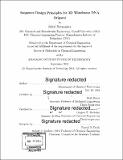Sequence design principles for 3D wireframe DNA origami
Author(s)
Ratanalert, Sakul.
Download1103713414-MIT.pdf (17.03Mb)
Other Contributors
Massachusetts Institute of Technology. Department of Chemical Engineering.
Advisor
Mark Bathe and Gregory C. Rutledge.
Terms of use
Metadata
Show full item recordAbstract
DNA is a highly programmable molecule that can be designed to self-assemble into nearly arbitrary 2D and 3D nanoscale structures. DNA origami is a particularly versatile method to achieve complex molecular architectures. However, the rules for designing scaffolded DNA origami have not been well-formalized, which hinders both the investigation of characteristics of well- and poorly-folded structures as well as the participation of a larger scientific audience in DNA nanotechnology. In my thesis work, a fully automatic inverse design procedure DAEDALUS (DNA Origami Sequence Design Algorithm for User-defined Structures) has been developed that programs arbitrary wireframe DNA assemblies based on an input wireframe mesh without reliance on user feedback. This general, top-down strategy is able to design nearly arbitrary DNA architectures, routing the scaffold strand using a spanning tree algorithm and adding staple strands in a prescribed manner. The wireframe nanoparticles produced can use antiparallel crossover (DX) motifs, for robust selfassembly, parallel paranemic crossover (PX) motifs, for staple-free self-assembly, or a hybrid of the two, to minimize the number of staples required for folding to the ones necessary for functionalization. The thermodynamics of the self-assembly of these wireframe structures, and the effects of scaffold and staple routing, are investigated using quantitative PCR and FRET measurements, tracking fluorescence to elucidate global and local folding events. The framework developed should enable the broad participation of nonexperts in this powerful molecular design paradigm and set the foundation for further predictive models of DNA self-assembly.
Description
Thesis: Ph. D., Massachusetts Institute of Technology, Department of Chemical Engineering, 2018 Cataloged from PDF version of thesis. Includes bibliographical references (pages 143-151).
Date issued
2018Department
Massachusetts Institute of Technology. Department of Chemical EngineeringPublisher
Massachusetts Institute of Technology
Keywords
Chemical Engineering.